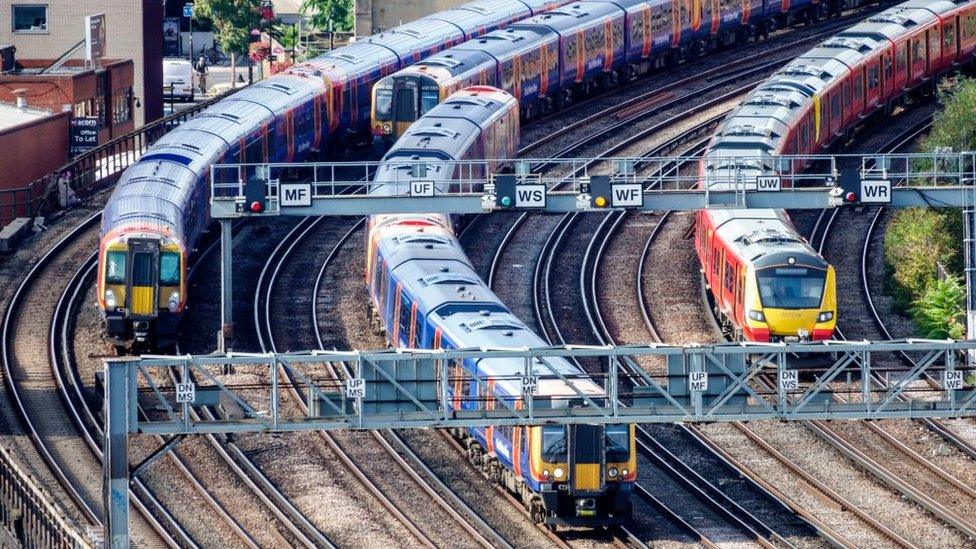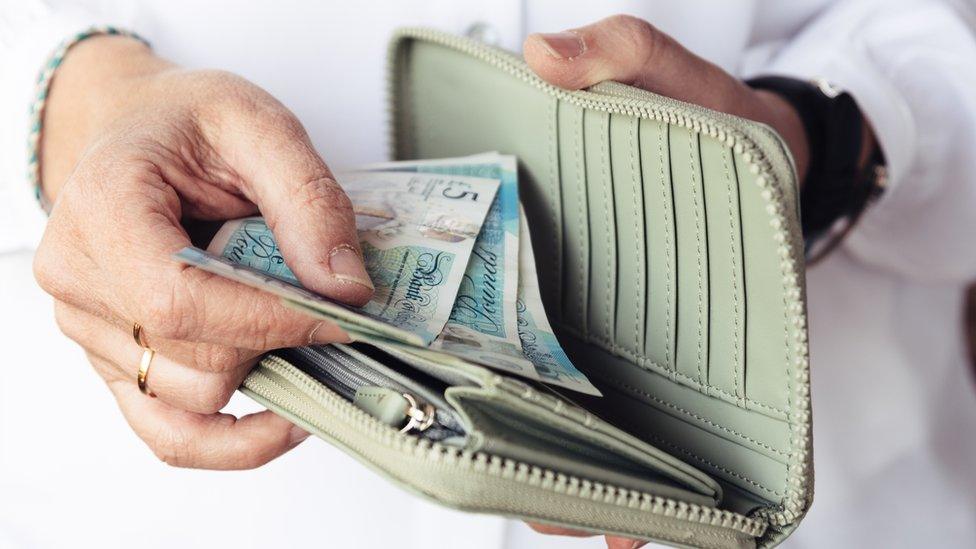Highest rail fare rise in nine years takes effect
- Published
- comments

The highest train fare rises for nine years have come into force for rail travellers in England and Wales.
Regulated fares in England and Wales will rise by up to 3.8%.
They cover around half of fares and include season tickets on most commuter routes.
Labour condemned what it called a "brutal" rise while the TUC union said it would "make it harder for city centres to bounce back" from Covid.
But the government said the increase was below the rate of inflation.
The current retail prices index (RPI) measure of inflation stands at 7.8%.
The rail fare increase is based on last July's RPI inflation rate. The increase in train fares would have been higher than up to 3.8% if the government used its normal formula of RPI plus 1%.
Nevertheless, Tuesday's rise is the steepest increase since January 2013, according to figures from industry body the Rail Delivery Group.
It comes at a time when the UK's cost of living is rising at the fastest pace for 30 years, with the rate expected to rise even further.
Train services remain under pressure from cuts in December when there were huge staff shortages due to the Omicron variant of the coronavirus.
Demand for rail travel remains around a third below pre-coronavirus levels.
'Protected'
Rail fare increases are normally introduced on the first working day of every year but have been delayed until March since 2020 due to the coronavirus pandemic.
"We have protected passengers by delaying these fare rises by two months and, even then, opting for a figure well below current inflation rates," said the Department for Transport.
"However, we must now look to recoup some of the £14bn which was spent to keep vital services running throughout the pandemic in a way that is fair for all taxpayers."
The Rail Delivery Group said: "It is important that fares are set at a level that will encourage more people to travel by train in the future, helping to support a clean and fair recovery from the pandemic."
'Feeling the squeeze'
But Railfuture, the campaign group, said the increase could not have come at a worst time.
"Ordinary working people are feeling the squeeze like never before, yet the government is stoking the fire of the cost of living crisis with these eye-watering fare increases," said Bruce Williamson of Railfuture.
He warned some passengers could be "bankrupted next year" if the formula for setting rail fare rises is unchanged, as inflation is "likely to hit 8%".
Labour's shadow transport secretary Louise Haigh said: "This brutal Tory fare hike will be a nightmare for millions of passengers, when families are already facing tax rises."
Labour calculated the rise leaves the average commuter paying £3,263 for their season ticket, 49% more than in 2010.
Trades Union Congress general secretary Frances O'Grady said: "Another rise in rail fares will hit commuters and make it harder for city centres to bounce back."


The cost of rail travel has been a Covid-enforced, but welcome, absence from the expenditure of many people working from home in the last two years. Now they face higher fares as they return to the office.
Those travelling in by car are being hit by sky-high petrol prices.
Bus operators are also likely to have to pass some of their increased costs on to passengers.
At least fares often have some element of routine to them, making them clear in any household budget.
Yet, by the time employees arrive at work, the added cost might make it harder to heed the Bank of England governor's call for restraint in asking for a pay rise.

How will fare rises affect commuters?
The increase by up to 3.8% will lead to rises in the cost of annual season tickets such as:
Brighton to London (any route): Up £194 to £5,302
Liverpool to Manchester (any route): Up £105 to £2,865
Neath to Cardiff: Up £70 to £1,922
The Campaign for Better Transport reckons the rise will mean the average full-time worker commuting from Brighton into London will have to work for seven weeks just to pay for their annual season ticket.
Its chief executive, Paul Tuohy, pointed out that London commuters "will be hit by a double whammy as bus and tube journeys in the capital go up 4.8% from today".
The rises will add between 10p and 30p to most single fares on the capital's buses and underground trains.
Londoners are also set to be hit by tube strikes over jobs, pensions and working conditions on Tuesday 1 March and Thursday 3 March.
In Scotland, a 3.8% increase in fares was implemented on 24 January.
Rail fares in Northern Ireland are set by state-owned operator Translink, which does not use RPI.
Related topics
- Published16 February 2022

